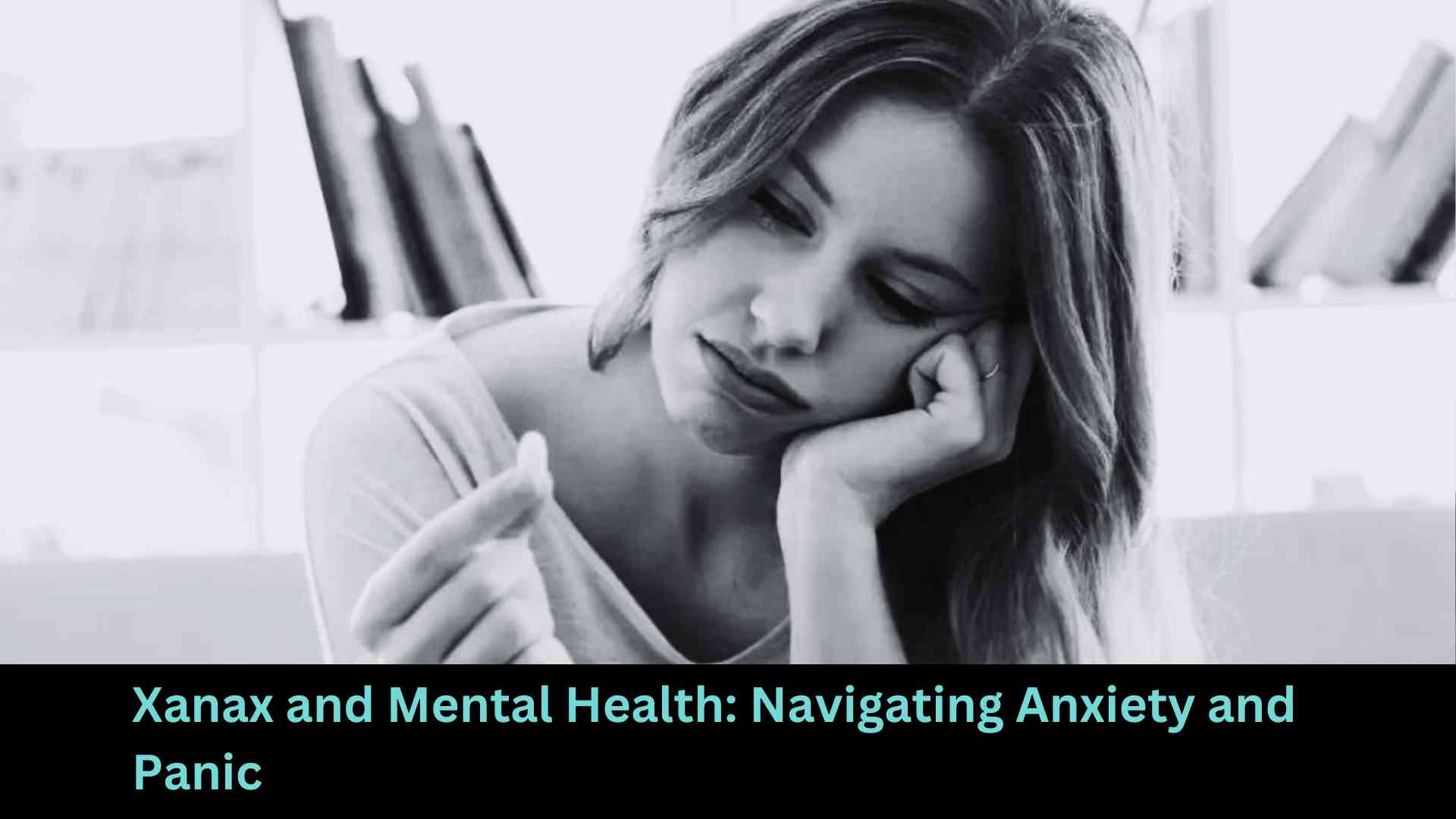
- Xanax
-
by rohit1
Xanax and Mental Health: Many people often associate Xanax, a widely recognized brand name for the generic drug alprazolam, with anxiety and panic relief. However, its use in the context of mental health is a complex topic that goes beyond just medication.
In this comprehensive guide, we will explore the many sided relationship between Xanax and mental health. We will examine how it functions. We will also discuss its role in treating anxiety and treating panic disorders.
Additionally, we will explore possible advantages and dangers. Furthermore, we will consider other options available. Lastly, we will discuss the significance of a holistic approach to mental health.


Xanax and Mental Health: Table of Contents
- Xanax and Mental Health: Introduction
- Understanding Mental Health
- A Tool in the Mental Health problems Toolkit
- Mechanism of Action
- How Xanax Works in the Brain
- Balancing Brain Chemistry
- Xanax in Mental Health Treatment
- Managing Anxiety Disorders
- Addressing Panic Attacks
- Role in Co-occurring Disorders
- Benefits and Risks
- Rapid Relief from Anxiety
- Potential for Dependence and Tolerance
- Cognitive and Emotional Impact
- Alternatives to Xanax
- Non-Benzodiazepine Medications
- client-centered therapy and Cognitive-Behavioral Approaches
- Lifestyle Changes and Holistic Practices
- The Holistic Approach to Mental Health
- Mind-Body Connection
- Nutrition and Exercise
- Mindfulness and Stress Reduction
- Xanax Withdrawal and Tapering
- Understanding Withdrawal Symptoms
- Safe step off Strategies
- Medical Guidance in Tapering
- The Importance of Professional Guidance
- Collaborative Decision-Making
- Individualized Treatment Plans
- Monitoring and Support
- Conclusion
- Balancing Xanax with Holistic Mental Health
- The Journey to Mental Well-being
- FAQs
- Is Xanax a suitable choice for managing my anxiety?
- How can I reduce the risk of Xanax dependence and mental illness?
- What are effective non-medication approaches to anxiety?
- Can lifestyle changes impact mental health positively?
- How can I locate the appropriate mental health expert suitable for my requirements?
Xanax and Mental Health: Introduction
Xanax and Mental Health understanding
Mental health includes encompasses emotional, psychological, and social well-being. It affects how people think, feel, and act, and it plays a pivotal role in their daily lives. Mental health conditions, such as anxiety and panic disorders, can significantly impact a person’s quality of life.
Xanax: A Tool in the Mental Health Toolkit
Xanax is one of the medications prescribed to manage symptoms of anxiety and panic. We should see its use in mental health as valuable but not the only solution, considering the broader context.
Xanax and Mental Health: Mechanism of Action
How Xanax Works in the Brain
Understanding Xanax’s mechanism of action is essential for appreciating how it can affect mental health. Xanax enhances the activity of gamma-aminobutyric acid (GABA), self-control Adrenalin that promotes relaxation and reduces anxiety.
Balancing Brain Chemistry
Xanax’s role in balancing brain chemistry involves counteracting the high-strung of certain brain regions associated with anxiety and panic. This action contributes to its calming effect.

Xanax and Mental Health Treatment
Managing Anxiety Disorders
Doctors frequently prescribe Xanax to manage anxiety disorders, such as Generalized Anxiety Disorder (GAD) and Social Anxiety Disorder. Its rapid onset of action makes it effective during acute anxiety episodes.
Addressing Panic Attacks
Xanax helps with panic attacks, giving fast relief from the strong fear and physical symptoms that come with them.
Role in Co-occurring Disorders
Xanax helps treat people with co-occurring disorders, where anxiety or panic symptoms overlap with other mental health conditions.
Xanax and Mental Health: Benefits and Risks of Xanax
Rapid Relief from Anxiety
Xanax is a medication that belongs to a class of drugs called benzodiazepines. Doctors commonly prescribe it to individuals who experience anxiety disorders or panic attacks. Anxiety can be a sapping condition that causes excessive worry, fear, and unease. During distress, like a stressful event or panic situation, Xanax can quickly help people feel calm and regain their composure.
Xanax contains alprazolam, which boosts the effects of a brain chemical called GABA to help with anxiety. GABA is responsible for inhibiting the activity of certain brain cells, which helps to reduce anxiety and promote relaxation. By increasing the effects of GABA, Xanax helps to quickly alleviate the symptoms of anxiety.
One of the key advantages of Xanax is its fast-acting nature. When you take it orally, it rapidly absorbs into the bloodstream and reaches peak levels within one to two hours. It is helpful when you need to quickly reduce anxiety, like during a panic attack or a very stressful event. The quick onset of action allows individuals to regain control over their emotions and function more effectively in challenging situations.
Xanax may cause addiction
Xanax may cause addiction, so doctors typically recommend it for short-term use. Using Xanax for an extended period or incorrectly can lead to a tolerance, requiring higher doses to alleviate anxiety. Abruptly stopping Xanax after long-term use can also result in withdrawal symptoms, including rebound anxiety, insomnia, breathing problem and scratchiness
In addition to its anxiety-relieving properties, Xanax may also have sedative effects. This can be beneficial for individuals who experience anxiety-related sleep disturbances or insomnia. By promoting relaxation and drowsiness, Xanax can help individuals fall asleep faster and improve the quality of their sleep.
It is important to use Xanax as prescribed by a healthcare professional and to follow the recommended dosage guidelines. Don’t take Xanax without a prescription or give it to others. It’s risky and could cause an overdose. It’s important to regularly call your doctor or healthcare provider when using Xanax to manage anxiety for safety and effectiveness.
Potential for Dependence and Tolerance
However, Xanax increase the risk of dependence and tolerance, which can develop with prolonged use and high doses.
Cognitive and Emotional Impact
Long-term use of Xanax can also have cognitive and emotional impacts, including memory issues, mood changes, and cognitive impairment.

Alternatives to Xanax
Non-Benzodiazepine Medications
Non-benzodiazepine medications for anxiety treatment exist, and one may consider them as alternatives to Xanax.
client-centered therapy and Cognitive-Behavioral Approaches
institute of mental health, particularly cognitive-behavioral therapy (CBT), offers effective non-medication approaches to managing anxiety and panic.
Lifestyle Changes and Holistic Practices
Lifestyle changes, including nutrition, exercise, mindfulness, and stress reduction techniques, can play a significant role in enhancing mental well-being.
The Holistic Approach to Mental Health
Mind-Body Connection
The mind and body have a connection, which means that physical health impacts mental health and vice versa.
Nutrition and Exercise
Proper nutrition and regular exercise can positively impact mental health by promoting physical health and reducing stress.
Mindfulness and Stress Reduction
Mindfulness practices and stress reduction techniques help individuals manage anxiety and panic by fostering relaxation and emotional regulation.
Xanax Withdrawal and Tapering
Understanding Withdrawal Symptoms
Break off Xanax can lead to withdrawal symptoms, which can be challenging. It’s essential to recognize these symptoms and plan for a safe tapering process.
Safe step off Strategies
Tapering, or gradually reducing Xanax dosage under medical supervision, is a safer way to discontinue the medication.
Medical Guidance in Tapering
Medical guidance is crucial during the tapering process to ensure individuals safely transition away from Xanax without experiencing severe withdrawal symptoms.

The Importance of Professional Guidance
Collaborative Decision-Making
Collaborative decision-making between individuals and mental health professionals is vital in determining the role of Xanax in their treatment plan.
Individualized Treatment Plans
Customized treatment plans consider each person’s unique needs, ensuring that we adapt the mental health approach to their specific situation.
Monitoring and Support Ongoing monitoring and support from mental health professionals contribute to successful mental health management

Conclusion
In the concluding chapter, we emphasize the importance of balancing Xanax use with a holistic approach to mental health. Xanax has usefulness, but individuals should use it alongside other methods to take care of their physical, emotional, and psychological health.
FAQs
The FAQs section addresses common questions and concerns related to Xanax’s role in mental health, alternatives, and holistic approaches.
This comprehensive guide aims to provide readers with a nuanced understanding of the relationship between Xanax and mental health. Considering the benefits, risks, other choices, and overall view of mental health wellness helps people make better decisions.
By exploring the benefits of a treatment or therapy, people can understand how it can improve their mental well-being. This exploration helps individuals think about the potential risks of a specific action. It allows them to make decisions that align with their personal values and priorities.
Moreover, considering alternatives is crucial in making informed decisions about mental health. Exploring different treatment options, therapies, or approaches can provide individuals with a broader perspective and a range of choices. This allows them to select the approach that resonates most with their unique needs and preferences. Considering other options helps people understand the limits or downsides of treatments, so they can make better choices.
Taking a holistic approach to well-being is another important aspect of making informed decisions about mental health. This involves considering not only the specific mental health concern at hand but also the broader context of person’s life. Factors such as physical health, social support, lifestyle choices, and environmental influences can all impact mental well-being.




